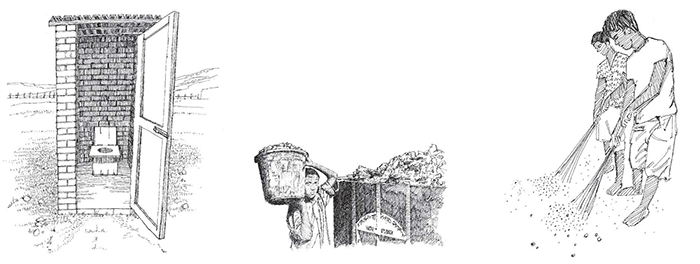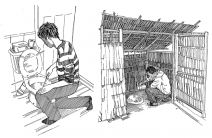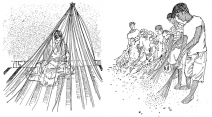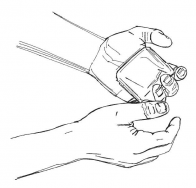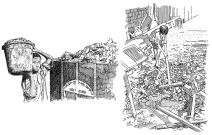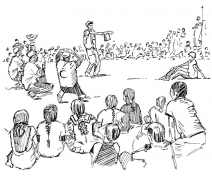32. Sanitation
32. Sanitation
Last update: 2025-06-03
Overview
- Good sanitation is vital to stop the spread of many epidemics such as diarrhoea and cholera, especially those spread through contact with rubbish or human waste.
- Volunteers can encourage communities to improve sanitation by safe excreta management, conducting safe burials for humans and animals, disposing of household and community rubbish appropriately, using latrines, and removing wastewater and standing water.
- The full involvement of the community from the beginning is necessary to ensure sustainability and good practices in the future.
What to do and how to do it
Solid waste management
- Dispose of solid waste and rubbish safely.
- Encourage the community to burn or bury rubbish.
- Promote knowledge about the relationship between rubbish and vectors like rodents or flies with diseases.
Wastewater management
- Drain or remove standing water. In refugee or IDP camps it would be necessary to ensure good drainage specially around latrines, showers or places to wash clothes. In other settings as well, keep vigilant also about stagnant water around these kinds of structures. At the same time, observe places or things, like buckets, for example, where people can keep (on purpose or not) stagnant water. Promote hygiene and teach people how to keep themselves safe and clean.
- Mobilize the community to reduce standing water where mosquitoes are likely to breed.
- Map and detect with the community the places in the area that are likely to have stagnant water.
- Promote knowledge around the community about mosquito breeding to avoid diseases like malaria. Ensure the relationship between mosquitos and diseases is known by the community.
- Promote that around showers, latrines and washing clothes areas gravel or other strategies are used to help with water drainage.
Sewage management
- Dispose of excreta (faeces) safely (by constructing latrines).
- Promote the construction and use of latrines and make sure you have the community support to do so and to help you to find the best place to avoid water source contamination.
- Discourage open defecation.
- Ensure latrines are available for all users, women, elderly, children etc.
- Promote among mothers with babies the safe disposal of their excreta.
- Ensure the latrines have the minimum standards for protection, inclusion and dignity.
- Promote female friendly latrines whenever possible. These would include: adequate lighting; latches/locks on doors; soundly built walls and doors to ensure privacy and prevent people/animals going in and out; garbage receptacles for menstrual hygiene products and other disposable waste.
- Ensure appropriate housing and movement for companion and livestock animals such that their faeces and urine are not littering the environment or human habitation.
- Promote hygienic waste management and standard biosecurity measures on livestock farms and avoid dumping of such waste in the environment or in surrounding water bodies.
Safe disposal of human and animal tissue
- Practise safe burial or disposal of tissue:
- Bury corpses and destroy animal carcasses safely.
- Control disease vectors and protect people from them.
- Incinerate medical waste.
Talk to your community about proper sanitation practices.
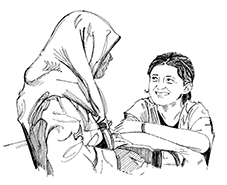
Dispose of waste safely.
